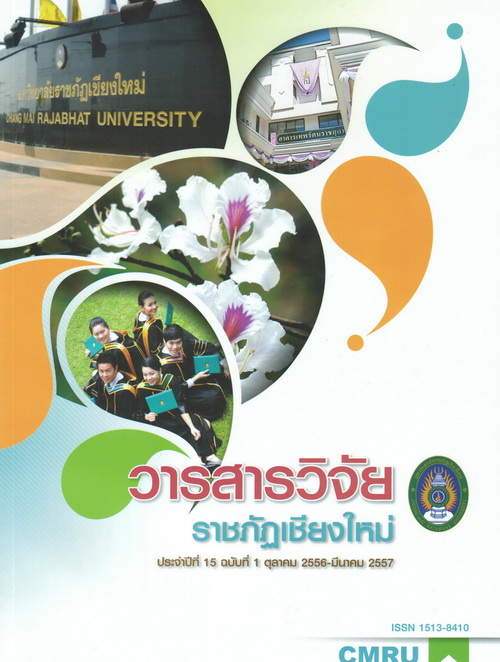รูปแบบและกระบวนการบริหารองค์กรปกครองส่วนท้องถิ่น เชิงพุทธบูรณาการ
DOI:
https://doi.org/10.14456/rcmrj.2014.96173Keywords:
การบริหารองค์กรปกครองส่วนท้องถิ่น, การบริหารองค์กรทางพระพุทธศาสนา, และหลักธรรมาภิบาล, local administration organization, administration organization by the Buddhism, and Good GovernanceAbstract
การศึกษาวิจัยนี้ มีวัตอุประสงค์ 3 ประการ คือ 1) เพื่อศึกษาหลักการบริหารองค์กรตามแนวทางพระพุทธศาสนา2) เพื่อศึกษาการบริหารองค์กรปกครองส่วนท้องถิ่นตามหลักธรรมาภิบาล และ 3) เพื่อสร้างรูปแบบและกระบวนการบริหารองค์กรปกครองส่วนท้องถิ่นเชิงพุทธบูรณาการ ทำการศึกษาจากหลักธรรมทางพระพุทธศาสนา ความคิดเห็นจากแบบสอบถามและทำการวิเคราะห์ข้อมูลจากกลุ่มตัวอย่าง ได้แก่ ผู้บริหารองค์กรปกครองส่วนท้องถิ่น ประซาซนทั่วไป ในองค์กรปกครองส่วนท้องถิ่น จำนวน 58 แห่ง ใน 8 อำเภอ จังหวัดลำพูน จำนวน 474 คน เป็นผู้บริหารองค์กรปกครองส่วนท้องถิ่น 174 คน ประซาซนทั่วไป 300 คน และจากการสัมภาษณ์ผู้บริหารระดับสูง จำนวน 5 รูป/คน ในจังหวัดลำพูน
ผลการศึกษาวิจัย พบว่า
หลักพุทธธรรมในการบริหารองค์กรตามแนวทางพระพุทธศาสนา คือ อธิปไตย 3 อคติ 4 พรหมวิหาร 4 อิทธิบาท 4 สังคหวัตถุ 4 อปริหานิยธรรม 7 สัปปุริสธรรม 7 หลักราซธรรม 10 หรือทศพิธราซธรรม และหลักจักรวรรดิวัตร
หลักการบริหารองค์กรปกครองส่วนท้องถิ่น ตามหลักธรรมาภิบาล ที่ปรากฏในระเบียบสำนักนายกรัฐมนตรีว่าด้วยการสร้างระบบบริหารกิจการบ้านเมืองและสังคมที่ดี พ.ศ.2542 กำหนดหลักการปฏิบัติไว้ 6 หลัก ได้แก่ 1) หลักนิติธรรม 2) หลักคุณธรรม 3) หลักความโปร่งใส 4) หลักการมีส่วนร่วม 5) หลักความรับผิดซอบ และ 6) หลักความคุ้มค่า
การบริหารองค์กรปกครองส่วนท้องถิ่น จำแนกตามหลักพุทธธรรมและหลักธรรมาภิบาล กลุ่มผู้บริหารมีความคิดเห็นเกี่ยวกับรูปแบบ และกระบวนการบริหารองค์กรปกครองส่วนท้องถิ่นเซิงพุทธบูรณาการ ระดับเกณฑ์ประเมิน อยู่ในระดับมากทุกรายการ เรียงลำดับจากมากไปหาน้อย ได้แก่ หลักอิทธิบาท 4 หลักลังคหวัตถุ 4 หลักพรหมวิหาร 4 หลักลัปปุริสธรรม 7หลักคุณธรรม หลักนิติธรรม หลักความคุ้มค่า หลักความรับผิดซอบ หลักการมีส่วนร่วม และน้อยที่สุดคือ หลักความโปร่งใสตามลำดับ
กลุ่มประซาซนทั่วไป มีความคิดเห็นในรูปแบบและกระบวนการบริหารองค์กรปกครองส่วนท้องถิ่นเซิงพุทธบูรณาการระดับเกณฑ์ประเมิน อยู่ในระดับมากทุกรายการ เรียงลำดับจากมากไปหาน้อย ได้แก่ หลักอิทธิบาท 4 หลักลังคหวัตถุ 4 หลักพรหมวิหาร 4 หลักลัปปุริสธรรม 7 หลักคุณธรรม หลักความคุ้มค่า หลักความรับผิดซอบ หลักนิติธรรม หลักความโปร่งใสและน้อยที่สุดคือ หลักการมีส่วนร่วมตามลำดับ
กลุ่มผู้บริหารระดับสูงของจังหวัดลำพูน จำนวน 5 รูป/คน มีความเห็นสอดคล้องกัน การนำเอาหลักธรรมทางพระพุทธศาสนามาบูรณาการกับการบริหารองค์กรปกครองส่วนท้องถิ่น มีหลายหัวข้อธรรม ได้แก่ ไตรสิกขา สมาธิ 7 ลังคหวัตถุ 4 สัปปุริสธรรม 7 อิทธิบาท 4 พรหมวิหาร 4 หิริโอตัปปะ โสรัจจะ มโนธรรม คุณธรรม ศรัทธา การมีสติ การลดทิเ และทศพิธราซธรรม 10
รูปแบบและกระบวนการบริหารองค์กรปกครองส่วนท้องถิ่นเชิงพุทธบูรณาการ มีลำดับขั้นตอน ได้แก่ 1) กำหนดยุทธศาสตร์การบริหารองค์กร ด้วยการปลกฝืงค่านิยมที่พึงประสงค์ 2) การบรณาการหลักการบริหารทางพุทธศาสนาและหลักการบริหารแบบธรรมาภิบาล เพื่อกำหนดค่านิยมที่พึงประสงค์ขององค์กร 3) กำหนดวิธีการบริหารองค์กรให้ความรู้ โดยการสัมมนา ‘ฝึกอบรม เพื่อพัฒนาตน พัฒนาบรุคลากรและการพัฒนาองค์กร และ 4) กำหนดลักษณะการบริหารที่พึงประสงค์ เพื่อประโยชน์ตน (องค์กร) ประโยชน์ผู้อื่น (ประซาซน) และมีประโยชน์แก่ทั้งสองฝ่าย สามารถเป็นต้นแบบและเป็นแบบอย่างที่ดีให้แก่องค์กรอื่นๆ ต่อไป
THE MODEL AND PROCESS OF LOCAL ADMINISTRATION ON INTEGRATED BUDDHISM
This dissertation consists of 3 objectives: 1) to study the principles of Buddhist management, 2) to study the principles of Good Governance in the management of the local government, 3) to create patterns and processes of local governments on integrated Buddhism. Data were collected and analyzed from questionnaires on the application of the principles of Buddhism. The sample came local government administrators and citizens in 58 local governments in 8 districts of Lamphun province, This studied used 474 samples, as an executive organization of 174 administrator, 300 citizens and concluding of the interview of 5 chief executives in Lamphun Province.
The results revealed that:
The principles of Buddhadhamma in management of the organization are: Adhipateyya, Agati, Brahmavihara, Iddhipada, Sangahavatthu, Aparihaniyadhamma, Sappurisadhamma, Rajadhamma or duties of the king and Cakkavatti-vatta.
The principles of Good Governance in local government issued in the Order of the Prime Minister with the creation of governance and social good in 2542 B.E. (1999 A.R.), consisted of 6 rules as thefollows: 1) rule of law 2) virtue 3) transparency 4) participation 5) responsibility and 6) value.
in local administrative organizations, administrators evaluated the principles of Buddhadhamma and Good Governance, regarding the model and process of local administration from the highest in descending order as follows: Iddhipada, Sangahavatthu, Brahmavihara, Sappurisadhamma, the virtue, the rule of law, the main value, the primary responsibility, the participation, and lowest the transparency.
The citizens evaluated the principles of Buddhadhamma and Good Governance, regrading the model and process of local administration from the highest in descending order as follows: Iddhipada, Sangahavatthu, Brahmavihara, Sappurisadhamma, virtue, value, responsibility, rule of law, the transparency and lowest the participation.
The chief executives group of Lumphun province affirmed that the principles of Buddhism should be integrated in the management of local government. Many religious topics such as: Sikkha, Samadhi, Sangahavatthu, Sappurisadhamma, Iddhipada, Brahmavihaara, Hiri-Ottappa, Soracca, Manodhamma, Virtues, Saddha, Sati, Ditthi and Rajadhamma or duties of the king, were included
The model and process of local administration based on integrated Buddhism have a sequence of stages: 1) to cultivate desirable values in the strategic management of the organization 2) to set up desirable values to determine the principles of integrated Buddhism and Good Governance in local the organization 3) to determine how to give organizational knowledge through seminars, training for human resource and organizational development 4) to determines the desirable qualities for the sake of organization identity, people benefit that they can be a model and a role model to other organizations.
Downloads
Downloads
How to Cite
Issue
Section
License
1. Articles, information, content, images, etc published in the “Community and Social Development Journal” are copyrighted by the Community and Social Development Journal, Chiang Mai Rajabhat University. In order to properly distribute the articles through print and electronic media, the authors still hold the copyright for the published articles under the Creative Commons Attribution (CC BY) license, which allows the re-distribution of the articles in other sources. References must be made to the articles in the journal. The authors are responsible for requesting permission to reproduce copyrighted content from other sources.
2. The content of the articles appearing in the journal is the direct responsibility of the article authors. The editorial board of the journal does not necessarily agree with or share any responsibility.














